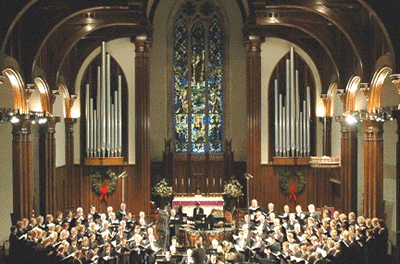On the evening of December 16, six men walked to the center of the Scott Concert Hall stage in the Porter Center in Brevard and with no ceremony began to sing. The audience had been quiet. Now it fell as silent as I have ever heard a sell-out crowd of 600 as the clean, pure harmony of the King’s Singers filled the room. These performers, all former Choral Scholars of King’s College, Cambridge, with over thirty-plus years of working closely together, have brought their own remarkable refinement to the already refined art of choral singing that is practiced in colleges, “quires, and places where they sing.”
Over the course of the evening, it was possible to hear each of these voices solo, to assign it to one of the gray-suited bodies on stage, and to realize that none of them has a beautiful voice. Yet without having beautiful voices, they made some of the most beautiful music I have ever heard. Every aspect of the art of singing was completely under their control, and yet they managed mostly to sound unrehearsed. I never saw anyone give a tactus or signal a cut-off. I never heard their pitchpipe. They didn’t jig up and down or sway back and forth. Their voices didn’t warble around the notes. They never sounded forced. They never gasped for breath. At the end of each piece they were so carefully practiced that, without closing their mouths, they merely quit singing. And they could sing in every style, in every manner, with every nuance, and from pianissimo to forte. And this was not an edited and dubbed tape: This was a flawless live performance!
Although countertenor timbre is not everyone’s cup of tea, I found David Hurley and Robin Tyson a perfect blend with the tenor, baritone, and bass voices. Hurley and Tyson sang like grown children, a world away from the equally-appropriate operatic countertenor of Alfred Deller or Drew Minter. There seemed to be a fair amount of voice crossing between Tyson and Hurley and tenor Paul Phoenix; everyone’s range seemed to be large, without squeaks or stumbles at the crossovers. The same “grown children” quality was largely present in baritones Philip Lawson and Gabriel Crouch and bass Stephen Connolly, though when appropriate all six could growl like amorous farmhands.
During the first part of the concert I recalled my day residue. At lunch I heard reminiscence about an art history professor from the early 1970s. His hobbyhorse was the theory that all art was a progression toward the abstract, that in a few years total abstraction would be reached; then after lunch I heard a Canadian brass ensemble performing Christmas carols. These two concepts caused me to think about ensembles. A consort of brass instruments, or strings, or reeds, is an expression of the same abstract musical thought as a consort of human voices. They all seem to come as close to the abstract as music can, and yet the voices encompass verbal communication along with all the basic strengths of music in terms of human expression. Furthermore, the vocal consort is the spring from which all other music has flowed; it is the reverse of the professor’s theory.
Although I am willing to agree that any consort of like instruments, including four voices, is a fairly refined abstraction, I couldn’t agree less with the man in front of me who left at the intermission, grumbling, “I wish they’d vary it a little more.” The first half of the program included a huge variety of musical forms and two dramatic readings (the singing is worth a hundred of the reading). Of the pieces, I will single out only one: I heard the good old “Coventry Carol,” that dear hackney, in a totally new light, because of the precision of the dissonances. No choir of thirty can sing with the perfect intonation to make it convincing, but these six did.
Following intermission, there was a third dramatic reading and Saint-Saëns’s “Sérénade d’Hiver,” which added some gentle acting and body-language irony to the Singers’ already broad list of accomplishments. The program closed with a series of unlisted pieces (none of them like any version you’ve ever heard before) that composed a Christmas Close Harmony : “The Twelve Days of Christmas,” “Gaudete… Christus Natus,” “God Rest You Merry,” “Drummer Boy,” “Jingle Bells,” and “Deck the Halls.”
The verses of “The Twelve Days of Christmas” were interlarded with thank-you notes as they might have been written by a Victorian fiancée: gushingly romantic on the first day, growing less and less patient as the poultry and livestock accumulated, and threatening legal action by the time the twelve lords a leaping began to take liberties with the milkmaids and dancing ladies. Every letter brought a big laugh from the audience. “God Rest You Merry” had been recast in the rhythm of Brubeck’s “Take Five,” with the appropriate Swingle Singer-y harmonies. “Drummer Boy” was a fairly straight albeit extremely complex arrangement; “Jingle Bells” was incredibly fast and furious, with whipcracks made from sharp handclaps.
Almost every piece in the program was a special arrangement, many of them by Singers baritone Philip Lawson; the arrangements in themselves would have been complete justification for raving about this performance. Adding to that the Singers’ incredible vocal skills and smooth showmanship made this one of the most exciting and delightful concerts I have ever attended. As a coda, let me praise the acoustics of the Scott Concert Hall, totally equal to the superlative of the previous paragraph. I bought a King’s Singers CD on my way out; my wife played most of it when I got home. Although professional in every way, the warmth, skill, and precision were just so many 1s and 0s burned in plastic; the magic was gone. So if you ever have the opportunity to hear the King’s Singers live, don’t miss them!











